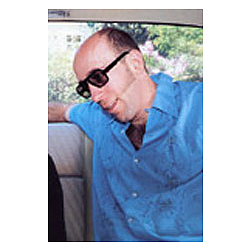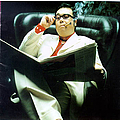Markus Nikolai Biography
Markus Nikolai has music in his genes. Since his initial love affair with all sounds electronic in the early eighties, he has conquered DJing and the live performance, but it is the production realm of dance music in which he has made his most significant contributions. Born in Frankfurt and raised in the city’s suburbs, Markus learned several musical instruments from his grandfather, a conductor. Though he was proficient in piano, guitar, bass, drums and other percussions, the accordion was his main interest. As a teenager in the eighties, he was exposed to nightclubs, dancing and the instrument of the era – the keyboard. In 1982, Markus left the accordion behind to pursue more alternative sounds. One year later, joined by two like-minded friends, he launched his first live project, Whetzon Churchill. Frankfurt embraced their industrial/electronic body music (EBM) and the group performed regularly in and around the city for several years. In 1987, Whetzon Churchill became the first live act to play a small venue called No Name, home of the weekly Techno Club, one of the city’s most legendary nights. This was also the year in which his first tracks were released and a time when Markus was gaining experience behind the decks. “I DJed back in the days of 1986 and 1987,” he says. “After a while, I realized that (with DJing) I could only play music which was already complete. I wanted to produce music that didn’t exist; new sounds, which nobody had heard before.” In Markus’ words, “The producer delivers the sound for the DJ and the DJ brings the sound to the people.” As a producer, his style is built on the foundation of his sensory environment, including his surroundings, emotions and even the weather. Combined with the musical influences of his predecessors, ranging from Kraftwerk to Bob Marley, George Clinton to Afrika Bambaataa and Stevie Wonder to Prince, Markus builds his sound on the plethora of favorable things in life. Straddling the boundaries of quirky house and minimal techno, he is able to consistently create something different from the mainstream musical flood while producing records that DJs enjoy and utilize. Sitting back from the abrupt lights and tumultuousness of the inner club, he is comfortable knowing that from the background he plays a major role in the global dance scene. A visionary in the most honest sense of the word, Markus has spent many years leading a kind of double life. Along with his sonic ventures, he is also an optometrist, currently owning two shops in Frankfurt. He continues to focus on both his business and his exploration of art, music and other creative outlets. In 1992, Thomas Franzmann (a.k.a. Zip) joined one of Markus’ first production outfits, Bigod 20 (which also included Front 242 vocalist Jean-Luc De Meyer), a relationship that would become one of his most resourceful and symbiotic. Soon after, Los Angeles’ Sire/Reprise released their album Steelworks, from which tracks and video clips were used in the films Cape Fear and Sliver. In 1994, Markus released his second album with Zip, Supercute, also on Sire. In the mid-nineties, along with graphic artist Chris Rehberger, the trio founded the audio/visual project, Pile, an experiment in melding music, graphic design, philosophy, film and architecture. In 1997, they released the album Modern on Sony/Epic and two years later, the group toured through Europe as part of the futuristic art exhibition, Lab 0.1 for Daimler Chrysler. Later that year, Markus and Zip launched their own imprint, Perlon. “We have always wanted to keep Perlon as a family label,” says Markus. So almost all the artists (for example Ricardo Villalobos, Baby Ford, Sammy Dee etc.) are friends. In 1999, the SuPERLONgevity compilation was released; it featured “Bushes,” a track that has since garnered chart-topping remixes from the likes of Derrick Carter and Fatboy Slim. Markus also contributes to countless other projects, including Florida with Thomas Brinkmann, Darren with Chris Rehberger, Pico Rocco with Max Loderbauer from Sun Electric and Morane with composer and acoustic musician Theo Krieger. From 1998 through 2000, Markus hosted the Peak Club on Sundays in Frankfurt. Initially a meeting of similar musical minds attracting many DJs who passed through the city, the event eventually became one of the most eclectic spots in Germany. In June 2000, Markus released Back, his first solo album on Perlon. In the summer of 2001, he opened his second optical store MNO (MarkusNikolaiOptic), launched his own Design/Framecompany MNE (MarkusNikolaiEyewear). 2005 Markus and Theo Krieger newly founded the label “More down than out” to release their own music. Markus, Theo Krieger and Annika Mueller de Vries also started the band “Morane”. In May 2005 the 12” “Morane - Electric Pilot Girl” was released. In june 2005 the album “Everyone is like you” was released. At the moment Markus is working on new Projects with Thomas Brinkmann and Stephanie D. Chico and on his new own Album. A little glimpse can be heard on Perlons Superlongevity 4: Markus Nikolai with Stephanie D. Chico – Wheelsucker, which was released in May 2006. He continues to travel the globe diffusing his unique sound within all walks of life. Through touring his live performance, he is able to “present his own definition of house music.”
Markus Nikolai Lyrics
Write a comment
What do you think about Markus Nikolai? Let us know in the comments below!
Similar artists
- Fantastic Plastic MachineElectronic
- Justus KöhnckeElectronic
- SwayzakElectronic















